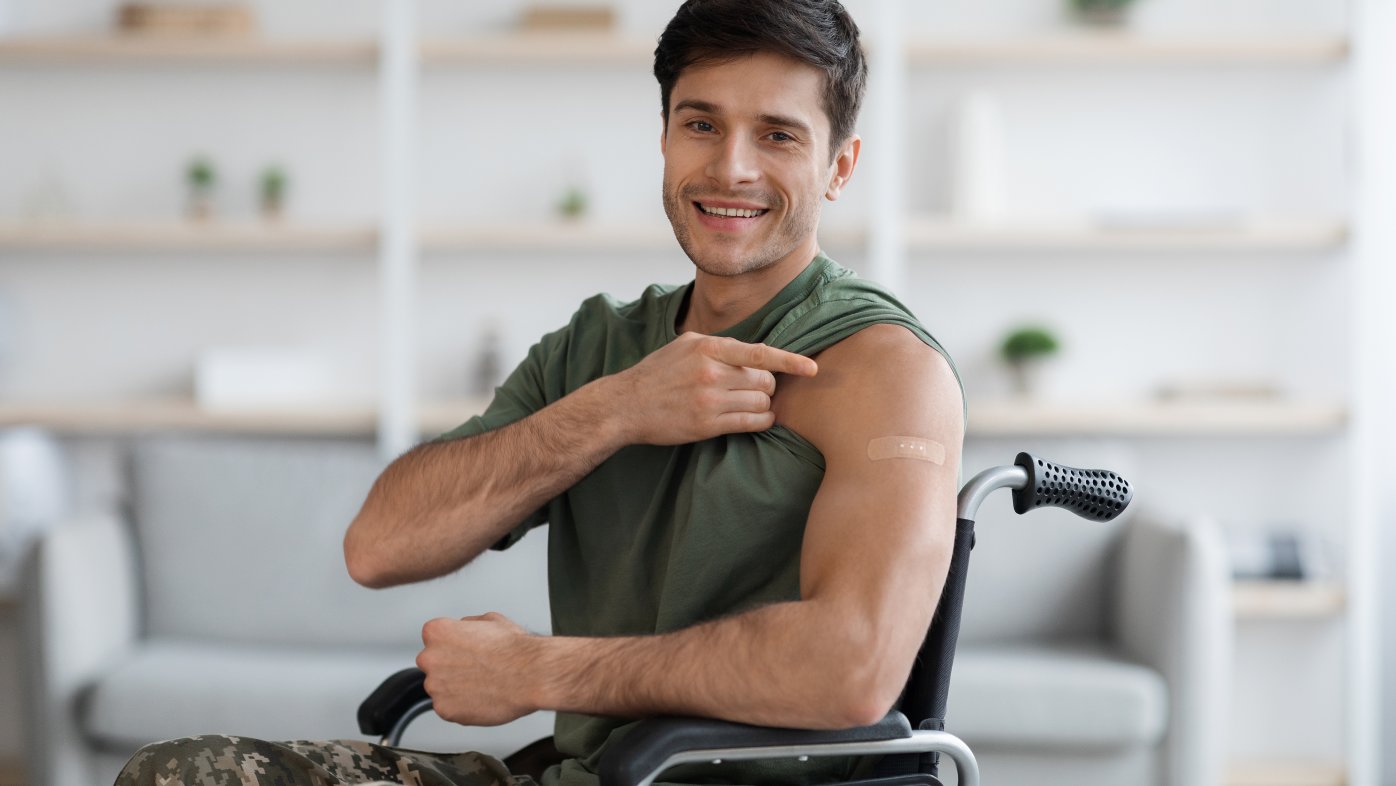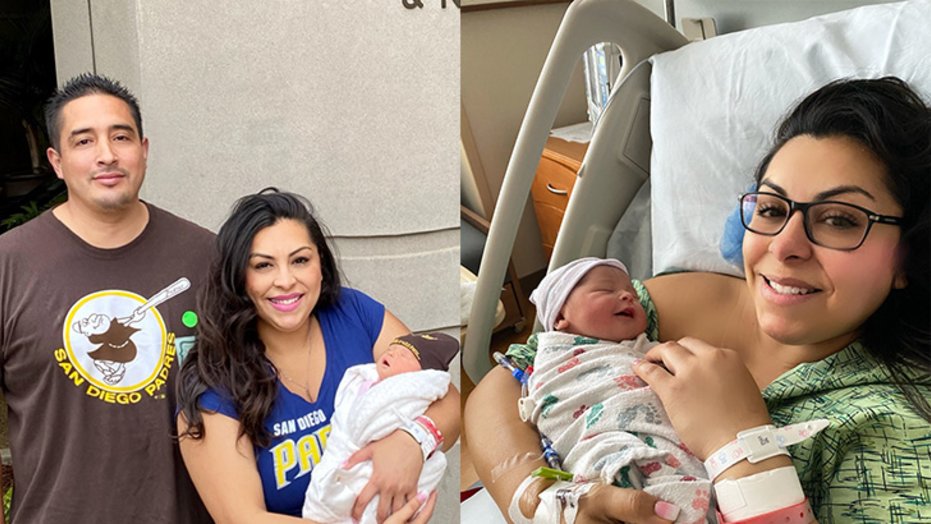
Should you get a flu shot if you already had the flu?
Vaccination, even after having flu-related illness, is recommended for everyone age 6 months and older with rare exception.
Most stories have just one hero. But the wonderfully miraculous story of the Aguon-Hernandez family, which takes place during a pandemic, boasts three of them.
First, there's Rosa Maria Hernandez, a Latina nonprofit executive with Type 1 diabetes and a drive to change the world. Then, there's her husband, Joe Hernandez Aguon Jr., who was asked on their first date if he wanted kids and, as Rosa Maria says, "didn't run for the hills"; instead, he became her source of strength during a pandemic and high-risk pregnancy. And finally, there's little Leilani, the "miracle baby" who came during a perfect storm of a global crisis and chronic illness.
Each of these three are heroic in their own unique way, as they demonstrate just what is possible when love, strength, resilience and self-advocacy come together in the most challenging circumstances.
Knowing which questions to ask
Rosa Maria has always known the value of self-advocacy. An expert in nonprofit development with a focus on diversity and inclusion, she learned early — with her diagnosis of Type 1 diabetes at age 17 — that she would have to take control of both her health and her career to open doors for herself and other women like her.
"Being a Type 1 diabetic as a Latina is something that is almost unheard of," Rosa Maria says. "So it was a very lonely experience, and one in which I had to self-teach some and rely on my team of doctors. But I have learned that the way you ask your questions will lead to the answers that may best serve you on your own unique journey. I am blessed to not be afraid to ask questions to get the result that I need."
This skill translated well to Rosa Maria's professional — and love — life. Highly driven and work-focused, Rosa Maria was on a successful career trajectory when she met Joe, a trainer with a company that manufactures and installs mechanical doors.
He laughs as he remembers their first date, when she asked him if he thought he'd ever want to have a child. "She told me, 'I have this medical condition and it's not going to be easy, but I do want to see if I can have at least one child. I know it's a much deeper conversation for later, but is that something that you might want?' I told her I'd always wanted to have a daughter."
"This crazy question on our first date was his ticket out, but he stuck around," she says. And the couple married not long after.
A challenging path toward pregnancy
Along with diabetes, Rosa Maria also has polycystic ovary syndrome (PCOS), a disorder that affects a woman's hormones. She always knew that becoming pregnant with both conditions would be a challenge, but she wasn't aware of what it really entailed.
"No one told me I might have to take medication to conceive, or have to try for a year before even being considered a candidate for fertility treatments, or that I might want to look into freezing my eggs," Rosa Maria says. "And as a young woman, I wish someone would have told me to be prepared to make these decisions and have these very serious conversations, not just for myself as I grew in my career and planned my life, but also with my significant other."
A couple of years into their marriage and as COVID-19 spread across the globe in early 2020, the couple decided to hunker down, work and enjoy virtual social events with their friends, while putting these big discussions on hold for a bit. Rosa Maria, an avid runner, was determined to keep up her fitness and thought they could use the time in lockdown to save some money and later figure how they might move forward in their desire to build a family — most likely with the aid of fertility treatments — post-pandemic.
When Rosa Maria missed a menstrual cycle late in the summer, mere months after the pandemic began, she didn't give it a second thought. However, her OBGYN recommended that she take a pregnancy test.
"I thought, 'whatever.' Never did I imagine I might be pregnant," Rosa Maria remembers. "I went to my local drugstore and got two pregnancy tests. I took the tests and did a double take, I was so shocked. I sent a message to my doctor that said, 'I'm confused. The tests are positive.'"
Pregnant, but not quite prepared
Sure enough, the tests were correct. And while thrilled with the results, Rosa Maria was also terrified.
"I was not prepared," Rosa Maria says. "As a diabetic, you're taught to always be in control. It's a life-or-death thing. If you're not in control, you can die, right? I just felt numb for a long time because I knew how many complications could really jeopardize the pregnancy."
She was so concerned that the couple decided not to share their exciting news with anyone else for 5 months, making for a very lonely pregnancy. But Rosa Maria credits Joe and her care team for getting her through. "I've had over 22 years to adjust to being a diabetic, but Joe's new to this and is just such a champ. He's been so patient, loving and understanding."
She met weekly with her diabetes educator, Cherie Roussos, RDN, a certified diabetes care and education specialist with the Sharp Rees-Stealy Center for Health Management, calling her a lifeline. And she considers Dr. Neelima Chu, a board-certified endocrinologist and internal medicine doctor with Sharp Rees-Stealy, a lifesaver.
"I relied a lot on my doctors and care team to help me get through the stress of it all - the glucose adjustments, anxiety, all the doctor appointments, the morning sickness," Rosa Maria says. "I didn't realize it was going to be that hard, and that hard on my body. And then on top of it all, there was COVID."
The pandemic affected everyone's lives, but for a woman like Rosa Maria, pregnant and with Type 1 diabetes, COVID-19 took away many of the milestones celebrated during a typical pregnancy. Scared to share the news of her pregnancy due to its high-risk status, unable to have Joe accompany her on her appointments, and physically distanced from their friends and family, including Joe's 14-year-old son from another relationship, Rosa Maria was forced to focus on her work, Joe and the things she was most grateful for.

Rosa Maria gave birth to her daughter, Leilani Vida Aguon-Hernandez, 37 weeks into her pregnancy at Sharp Mary Birch Hospital for Women & Newborns.
"Joe got all the hugs and kisses I couldn't give anyone else," Rosa Maria says as Joe smiles and shakes his head, remembering them all. "And I relied a lot on my close women friends who have gone through a similar experience. I also turned to my doctors to learn how we could stay healthy and safe while dealing with my pregnancy, my diabetes and the dangers of COVID - all of it. Knowing I could ask them questions and always get a response was priceless."
Make plans, but have options
One of Rosa Maria's biggest concerns was that she might catch COVID-19 and end up on a ventilator while pregnant. She did a crash course for Joe on all that could happen in a worst-case scenario and the role he would need to play if she weren't able to help him make tough decisions.
"There are so many issues for a woman with Type 1 diabetes that a typical woman might not have to consider," Rosa Maria says. "I learned to self-advocate a long time ago, but Joe was going to have to do it for me if something didn't go as planned. You need a partner who is willing to advocate for you, and that's exactly what Joe was."
Rosa Maria also credits her doctors and other care providers at Sharp. "Because of my diabetes, Sharp had become like my second home over the years. I was there a lot and I knew I was in good hands."
After going in to Sharp Mary Birch Hospital for Women & Newborns at just 37 weeks into her pregnancy due to feeling a bit "off" and having high blood pressure, Rosa Maria still hoped her baby could be delivered by vaginal birth. However, her placenta ruptured - a serious condition in which the placenta separates from the wall of the uterus before birth - and she ended up requiring an emergency cesarean section.
"We were told our baby was in distress," Joe remembers. "And they quickly moved Rosa to the OR for the C-section. I was so nervous, just praying."
His prayers worked. Soon after, their beautiful baby girl, Leilani Vida Aguon-Hernandez, was born. She was sent to the NICU for a brief period — just 5 hours — to ensure she was healthy and well, and Joe accompanied her.
"I was sending messages to Joe to remember to stay with her every second, take pictures, remember her test scores, do skin-to-skin contact with her," Rosa Maria says. Joe fulfilled all her wishes, but one. "I was the only male in the NICU. I was not going to suddenly rip off my shirt and grab the baby from the nurses," he says laughing.
By the time Rosa Maria was transferred to a postpartum room, Leilani was there with Joe, waiting to meet her mom.
Heroes in their own way
While Rosa Maria proudly describes Leilani as a "very independent, good baby," she admits Leilani, like all babies, can occasionally be fussy. This, she says, is not Leilani being impatient, but rather exercising her leadership skills.
There's no question where Leilani might get them. At just a couple of months old, she is already heroically leading the way as a beautiful example of what is possible for Latina women, women with Type 1 diabetes, career women, couples building their lives together, and families of all types.
As for her mother, already recognized as a champion for Latina women and people with Type 1 diabetes, Rosa Maria now adds advocacy for pregnant women and working parents among her passions. She and Joe acknowledge how lucky they are to have high-quality health insurance and health care, to have been able to work from home during the pandemic, to have received COVID-19 vaccines during her pregnancy, and to be able to enjoy maternity and paternity leave, privileges many people — especially people of color — do not have.
"It has been a part of my path to educate our communities and advocate for others," Rosa Maria says. "I am still not afraid to ask the tough questions or have the uncomfortable conversations. Together, we're going to write our own narrative about how things should work to benefit everyone — not just some people — to ensure that companies, organizations and systems are not just being told what they should be doing, but actually doing these things because they want to."
Our weekly email brings you the latest health tips, recipes and stories.